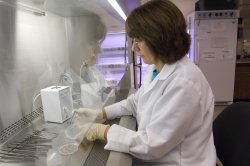Molecular Tree Physiology Lab

The Molecular Tree Physiology Lab is a 1,500-ft2 molecular genetics laboratory in the newly constructed addition to the David C. Pfendler Hall of Agriculture on the Purdue University (PU) campus. The lab is equipped with: 4- and 8-ft laminar flow hoods; refrigerator; standard and ultra-low freezers; fluorescently lit tissue-culture growth space (free shelving and incubator); BioRad gene gun with vacuum pump; SPEX freezer mill (Model 6750); two MJR thermocyclers; high-speed, refrigerated centrifuge (Beckman model J2- 21M, with four rotors); refrigerated centrifuge trap; two micro-centrifuges; two pH meters; three water baths; two Precision vacuum ovens; Digi-Doc gel documentation system; two digital balances; Labconco freeze drier; Barnstead NanoPureII water purification system; Reichert cryostat microtome; scanning spectrophotometer (Beckman DU-70); NanoDrop spectrophotometer (ND-1000); dishwasher; and all other minor equipment needed to undertake molecular biology research. Professor Meilan also has use of a 4,750-ft2 forest genetics lab where there are three LiCor 4200, Beckman Coulter CEQ 2000 XL, and two Perkin-Elmer 377 gene sequencers; AutoGen 2000 DNA extractor; four ultra-low temperature freezers; Eagle Eye II gel reader; walk-in cold room (4 ºC); and fluorometric plate reader.
21M, with four rotors); refrigerated centrifuge trap; two micro-centrifuges; two pH meters; three water baths; two Precision vacuum ovens; Digi-Doc gel documentation system; two digital balances; Labconco freeze drier; Barnstead NanoPureII water purification system; Reichert cryostat microtome; scanning spectrophotometer (Beckman DU-70); NanoDrop spectrophotometer (ND-1000); dishwasher; and all other minor equipment needed to undertake molecular biology research. Professor Meilan also has use of a 4,750-ft2 forest genetics lab where there are three LiCor 4200, Beckman Coulter CEQ 2000 XL, and two Perkin-Elmer 377 gene sequencers; AutoGen 2000 DNA extractor; four ultra-low temperature freezers; Eagle Eye II gel reader; walk-in cold room (4 ºC); and fluorometric plate reader.
Lab Location & More About Our Research
Department of Forestry & Natural Resources
715 W. State Street
West Lafayette IN 47907-2061
Learn about our nine Research Areas and meet our world-class faculty members.
Allied research centers seek to support and enhance the research and partnership enterprise at Purdue University. The centers are valued and encouraged as they create a venue for faculty to come together to pursue common goals. Forestry and Natural Resources faculty and staff are involved in six centers at the University.
The Department of Forestry and Natural Resources maintains an impressive collection of state-of-the-art research and education facilities. These labs, green houses, and educational facilities are a fundamental component that enables our faculty and students to learn, make new discoveries, and engage our clients in using these discoveries to sustain our nation’s ecosystems and natural resources.
